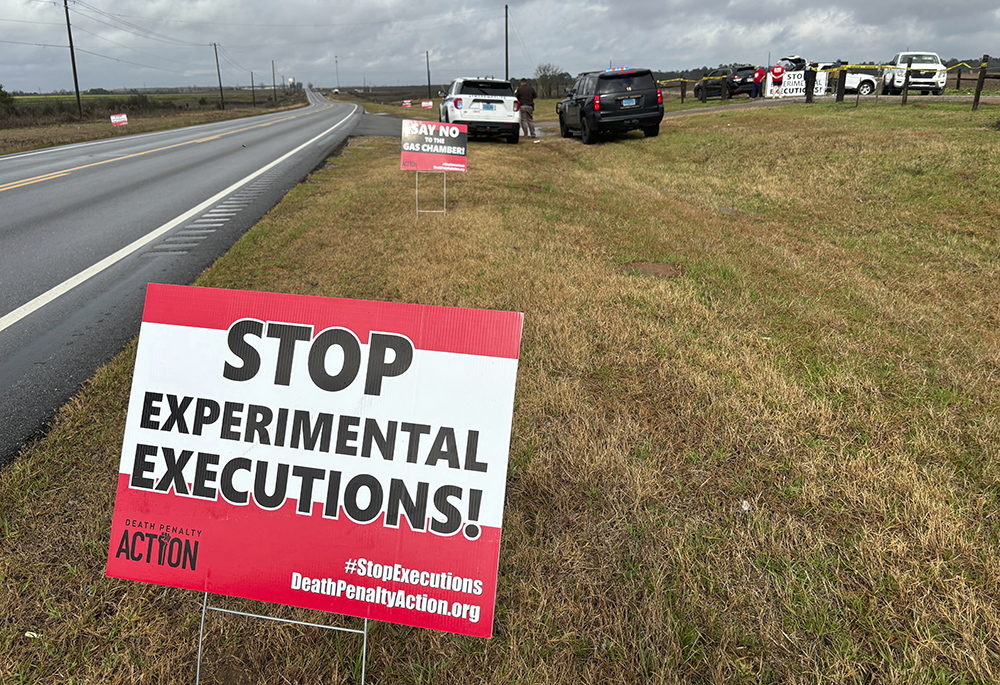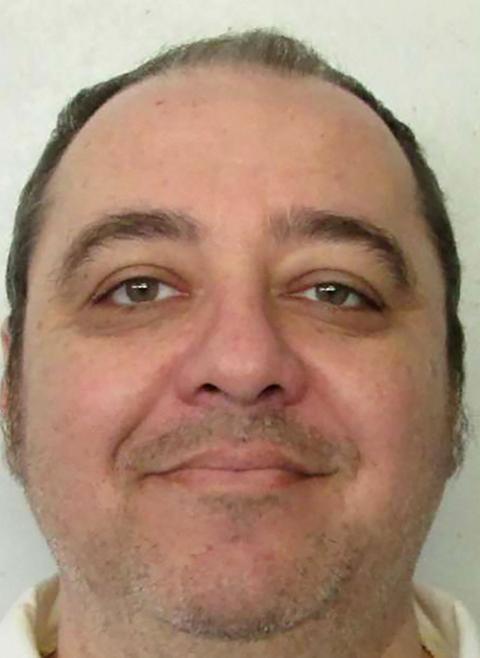
Anti-death penalty activists place signs along the road heading to Holman Correctional Facility in Atmore, Alabama, ahead of the scheduled execution of Kenneth Smith on Jan. 25. The state put Smith to death with nitrogen gas, the first time the new method has been used in the United States. (AP photo/Kim Chandler)
The execution of a man by nitrogen gas in Alabama is raising ethical questions about whether the practice is cruel and experimental.
The Jan. 25 execution of Kenneth Smith, 58, was the first in the nation in which nitrogen gas was used.
Alabama Attorney General Steve Marshall Jan. 26 described Smith's execution as "textbook" and said the process was "consistent" with what state officials had presented in arguments defending the method in court.

Death-row inmate Kenneth Smith poses for an undated booking photo at Holman Prison in Atmore, Alabama. Smith was executed by nitrogen gas Jan. 25, 2024. (OSV News/Alabama Department of Corrections handout via Reuters)
However, witnesses to the execution, including the Rev. Jeff Hood, Smith's spiritual adviser who was at his side, described a scene in which Smith convulsed on a gurney for several minutes before succumbing.
From the time the gas was first administered until Alabama Department of Corrections officials turned off the video to viewers in an adjacent viewing area, about 22 minutes had elapsed.
Catholic opponents of the death penalty and others concerned about its continued use in several states said the use of nitrogen gas as another form of execution opens the door for new discussions about whether capital punishment should continue.
Nationwide, capital punishment remains in place in 21 states; 23 states have abolished the practice. An executive pause is in effect in six states.
"I think it's extremely troubling. It's untested. Essentially Kenneth Smith was a guinea pig," Krisanne Vaillancourt Murphy, executive director of the Catholic Mobilizing Network, said of the use of nitrogen gas to execute someone. The network advocates to end the death penalty.
Smith's execution also gained international attention. The European Union and a team of four experts at the United Nations Human Rights Council in Geneva expressed concern about death caused by nitrogen hypoxia — depriving the body of oxygen — saying it is cruel and degrading.
Krisanne Vaillancourt Murphy, executive director of the Catholic Mobilizing Network, speaks at the Vatican Embassy in Washington Oct. 10, 2022, about World Day Against the Death Penalty. (CNS photo/Rick Reinhard, courtesy Catholic Mobilizing Network)
Catholic Church's stance
The Catholic Church has long opposed capital punishment. In August 2018, Pope Francis approved a revision to the Catechism of the Catholic Church acknowledging that over time there has been "an increasing awareness that the dignity of the person is not lost even after the commission of very serious crimes."
The revision of Paragraph 2267 continues by quoting the pope, saying, "Consequently, the Church teaches, in the light of the Gospel, that 'the death penalty is inadmissible because it is an attack on the inviolability and dignity of the person,' and she works with determination for its abolition worldwide."
The U.S. Conference of Catholic Bishops since 1980 has called for the death penalty to be abolished. Its 2005 document, "A Culture of Life and the Penalty of Death" reiterated the bishops' opposition to capital punishment.
In Alabama, neither Archbishop Thomas Rodi of Mobile nor Bishop Steven Raica of Birmingham commented on Smith's execution or the method employed to kill him. Spokesmen in both dioceses said their respective prelates have repeatedly called for the end of the death penalty. In 2016, the bishops of Alabama and Mississippi issued a statement calling for the end of the death penalty for support for the dignity of life following the murders of two women religious.
Nitrogen hypoxia
To carry out an execution using nitrogen gas, a respirator mask is fitted over a person's face and breathing air is replaced with pure nitrogen gas, depriving the person of oxygen. Nitrogen is harmless when mixed with the correct amount of oxygen. Earth's atmosphere is 78% nitrogen, 21% oxygen and 1% other gases.
According to The Associated Press, "The state had predicted the nitrogen gas would cause unconsciousness within seconds and death within minutes."

The Rev. Jeff Hood, Kenneth Smith's spiritual adviser (Courtesy of Jeff Hood)
Hood was particularly troubled by what he witnessed in the execution chamber, telling NCR that Smith struggled to breathe for several minutes.
"He was heaving back and forth. He looked like a fish out of water," said Hood, who was incardinated in 2022 as a priest in the Old Catholic Church, which is not in union with the Roman Catholic Church.
"Every time he raised up he was slamming his head into the mask, his face mushrooming into the mask. Spitting and mucous, perhaps even vomit coating the inside of the mask, and it was drizzling down the mask. It was an unbelievably violent moment," Hood said.
"I can tell for 22 minutes, what I saw was torture," he said.
The American Medical Association's Code of Medical Ethics acknowledges that "an individual's opinion on capital punishment is the personal moral decision of the individual."
"However," it continues, "as a member of a profession dedicated to preserving life when there is hope of doing so, a physician must not participate in a legally authorized execution."
The American Veterinary Medical Association Guidelines for the Euthanasia of Animals of 2020 says that the use of argon or nitrogen for euthanizing mammals other than pigs is "unacceptable."

Michael McCarthy, an associate professor at the Neiswanger Institute for Bioethics at Loyola University Chicago (Courtesy of Michael McCarthy)
Michael McCarthy, an associate professor at the Neiswanger Institute for Bioethics at Loyola University Chicago, pointed to the AMA's code as well as widespread ethical standards for conducting medical or scientific research that prohibit the intentional killing or execution of a human being.
"If this is a form of trying to see if this would be a way [of execution] to use in other states, that would be some form of research that would be prohibited unless it was approved by any institutional review board under the common rule ... as to what type of research is able to conducted on prisoners. This [nitrogen gas execution] would clearly fall outside the bounds of research that would be approved by an institutional review board," McCarthy explained.
The widespread opposition to capital punishment across fields that encompass animal rights, physicians, medical research and the Catholic Church demonstrates, McCarthy said, "the broad alliance between many groups who don't often align on particular issues."
Why nitrogen?
The use of nitrogen gas has emerged as an alternate form of execution in recent years for various reasons. Pharmaceutical companies have prohibited the use of the drugs they produce for lethal injection. Experts also point to a series of botched executions as a reason that states have turned to nitrogen gas.
Deborah Denno, professor of law at Fordham University's Law School, said nitrogen gas execution is the sixth method now available to states. "I don't know of any other country that has so many different methods of execution. We just jump from one to the other when a method is getting into trouble," she said.

Deborah Denno, professor of law at Fordham University's Law School (Courtesy of Fordham University/Deborah Denno)
She questioned the "dishonesty" of Alabama officials for saying the procedure went according to plan and that Smith did not endure distress. "With Kenneth Smith, everybody around the world knew [what happened] and you have a lot of eyewitness accounts saying that it did not go well," she said.
Alabama in 2018 became the third state to authorize nitrogen gas execution, following Oklahoma in 2015 and Mississippi in 2017. Bills have been introduced in the Nebraska and Ohio legislatures to allow the method.
Citing the Constitution's Eighth Amendment prohibition of "tortuous execution or cruel and unusual punishment" and similar wording in state constitutions, the Death Penalty Information Center has echoed physicians and scientists in raising concerns about the protocols under which nitrogen gas execution would be carried out, said Robin Maher, its executive director.
"Ultimately, states are trying to find a method of execution that sits comfortable with the public," Maher told NCR.
"So, the fact that states have chosen to use the death penalty, which is their right, means that they also need to be held to the constitutional standard of assuring those executions are not tortuous and not gratuitously painful. These are very reasonable questions for taxpayers to be asking," she said.
Advertisement
Ohio's bill was introduced by Republican representatives Phil Plummer and Brian Stewart less than a week after Smith's execution. It received the backing of Attorney General Dave Yost, also a Republican.
The three political leaders said an alternate execution method was needed because no executions have been carried out in the state since 2018. In 2020, Republican Gov. Mike DeWine announced that lethal injection was "no longer an option" after a federal judge ruled the protocol could cause inmates "severe pain and needless suffering," according to The Associated Press.

Brian Hickey, executive director of the Catholic Conference of Ohio (Courtesy of Brian Hickey)
Stewart criticized DeWine's unofficial pause in executions during a Jan. 30 news conference introducing the bill, saying it was time Ohio resumed imposing the death penalty. The bill would allow inmates to choose between lethal injection and nitrogen gas, but would require nitrogen be used when the appropriate drugs could not be obtained.
Brian Hickey, executive director of the Catholic Conference of Ohio, said the state's bishops oppose capital punishment "in its totality."
"Whether you're using a lethal injection, or unfortunately, as the attorney general said, using nitrogen hypoxia, neither is humane," Hickey told NCR.
The conference sent a letter to all state legislators in October urging that the death penalty be abolished. Hickey said bills have been introduced in both chambers of the Ohio Legislature and "we're seeing very solid bipartisan support on both bills."
Vaillancourt Murphy said her organization was hopeful that DeWine, who is Catholic, would sign an abolition law before his second term as governor ends in January 2027.
"I hope in Ohio's case," she said, "it's another reason to have an important conversation and put this to bed."








